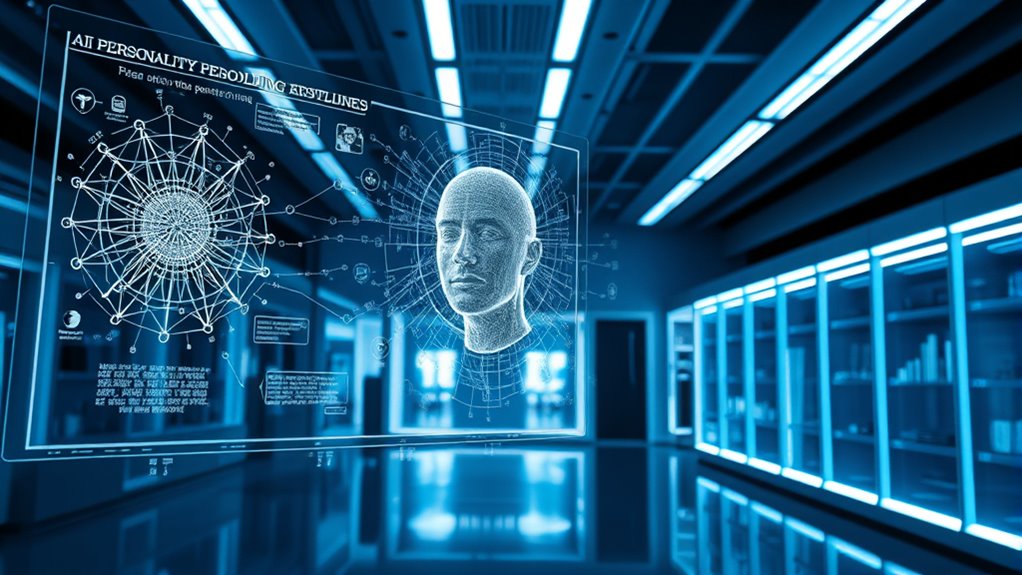AI personality profiling promises more personalized experiences by analyzing your speech, preferences, and behaviors to create detailed profiles. It can improve interactions, but it also raises privacy concerns, as your data is collected and used often without explicit consent. Ethical challenges include invasive profiling and potential breaches of trust. As the industry evolves, stronger regulations and responsible practices are emerging. To understand how this impacts you and what’s ahead, keep exploring these developments.
Key Takeaways
- AI personality profiling offers personalized experiences but raises privacy and ethical concerns regarding data collection and consent.
- It analyzes speech, behavior, and preferences to create detailed digital profiles of individuals.
- Risks include invasive profiling, potential misuse, and loss of user trust without transparent data handling.
- Industry efforts focus on transparency, user control, and responsible data use to balance benefits and risks.
- Future developments will likely involve tighter regulations, emphasizing ethical standards and user rights in AI profiling.

Have you ever wondered how AI can understand and mirror human personalities? It’s a fascinating development that’s transforming how machines interact with us. Through advanced algorithms and data analysis, AI systems can now analyze vast amounts of personal information—like speech patterns, preferences, and behaviors—to create detailed personality profiles. But as impressive as this technology is, it raises important questions about ethical concerns and user consent. When AI gathers and processes sensitive data to craft these profiles, it’s essential that users are fully aware of what’s happening and agree to it. Without explicit user consent, this practice can feel intrusive and even violate privacy rights. Many developers are now emphasizing transparency, ensuring users understand how their data is used and giving them control over their information. Still, the line between helpful personalization and invasive profiling isn’t always clear, which fuels ongoing debates about ethics in AI development. As you engage with AI-powered services—whether for customer support, mental health apps, or entertainment—you might not always realize that your interactions are contributing to a larger dataset designed to mimic your personality traits. This process involves collecting data points, analyzing tone, and recognizing behavioral patterns, all of which feed into creating a digital twin of sorts. The goal often is to make AI interactions more natural and tailored to your preferences, but it comes with the responsibility of handling data ethically. Companies must navigate the delicate balance of leveraging personal information to enhance user experience while respecting individual rights. If they neglect user consent or mishandle data, it can lead to distrust and potential legal repercussions. Additionally, understanding how data is processed can help users make more informed decisions about their privacy. For you, the user, it’s essential to remain aware of how your information is being used and to scrutinize the privacy policies of any AI-driven platform you engage with. As AI personality profiling advances, the importance of consent and ethical standards grows even more. Moving forward, regulations and industry practices will likely tighten to protect users, but individual vigilance remains essential. Ultimately, the promise of AI to personalize experiences is exciting, but it must be pursued responsibly. Respecting ethical concerns and prioritizing user consent aren’t just legal obligations—they’re fundamental to building trust and ensuring that AI’s benefits are shared fairly. As you navigate this evolving landscape, staying informed and advocating for transparent practices will help ensure that AI develops in a way that respects your rights and values.
Frequently Asked Questions
How Accurate Are AI Personality Profiles Compared to Human Assessments?
You’re wondering how accurate AI personality profiles are compared to human assessments. Generally, AI offers decent personality accuracy, but assessment reliability can vary. It analyzes patterns in data, which helps identify traits quickly, but it might miss nuances humans catch, like context or emotional subtleties. While AI can complement human judgment, it’s not a perfect substitute, so always consider combining AI insights with human evaluation for the most reliable results.
What Are the Ethical Concerns Surrounding Ai-Driven Personality Profiling?
You should consider that ethical concerns around AI-driven personality profiling include privacy concerns, as your data might be collected and used without full consent. Bias mitigation is also essential because algorithms can perpetuate stereotypes or unfair treatment. You need to guarantee transparency and fairness in these systems, so individuals aren’t unfairly judged or exposed to harm, maintaining trust and respecting personal rights.
Can AI Personality Profiles Adapt Over Time With New Data?
Think of AI personality profiles as chameleons, changing their colors with new data. With dynamic learning, these profiles can evolve over time, becoming more accurate as they absorb fresh information. This adaptability helps mitigate bias, making profiles more fair and personalized. However, it’s essential to monitor these changes carefully, ensuring the AI’s evolution remains transparent and aligned with ethical standards, so it truly reflects the person it’s meant to understand.
How Do Different Cultures Influence AI Personality Profiling Algorithms?
You should consider how different cultures influence AI personality profiling algorithms, as cultural biases can shape how these models interpret behaviors and traits. This impacts algorithmic fairness, risking misrepresentation or unfair treatment of users from diverse backgrounds. To promote fairness, you must incorporate diverse data and culturally aware design, ensuring the AI accurately reflects varied cultural norms and minimizes bias, ultimately making profiles more inclusive and equitable across all users.
What Industries Are Most Likely to Benefit From AI Personality Profiling?
You’ll find AI personality profiling most beneficial in marketing strategies and customer segmentation. It helps you understand individual preferences and behaviors, allowing you to tailor your messages and offers precisely. This personalization boosts engagement and loyalty, making campaigns more effective. By leveraging AI insights, you can optimize your marketing efforts, target the right audiences, and enhance customer experiences, ultimately driving growth and competitive advantage in your industry.
Conclusion
As we stand at the crossroads of AI personality profiling, you hold the compass. The technology is a double-edged sword—offering a treasure trove of insights but risking the shadows of misuse. Like a delicate tightrope walker, you must balance innovation with caution, guiding this powerful tool toward a future where understanding blossoms without invasion. Embrace the promise wisely, for the path you carve today shapes the human-AI dance of tomorrow.









